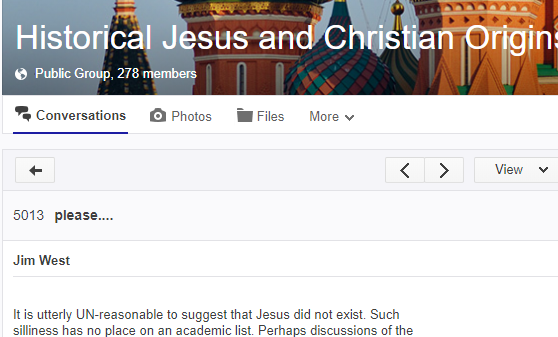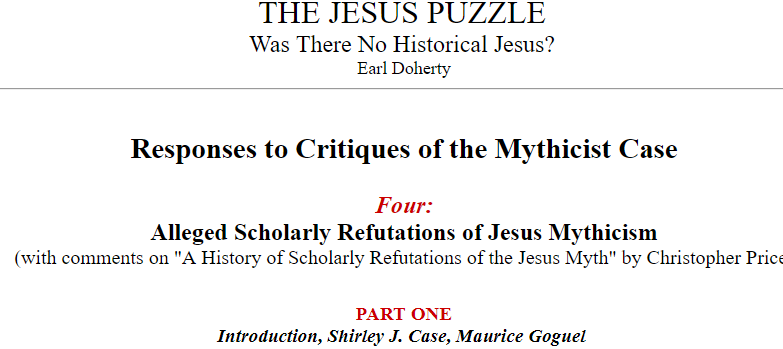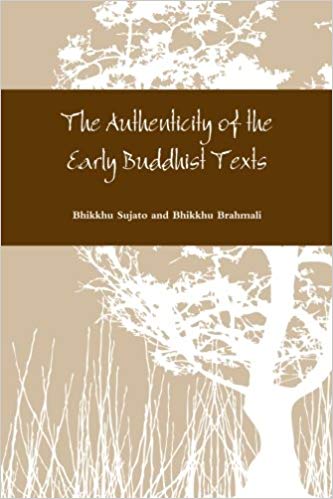 I recently wrote in a blog post:
I recently wrote in a blog post:
Roger Pearse, for instance, goes even further and without any suggestion that he is aware of Doherty’s arguments says they are “all nonsense, of course.”
A theme I come back to from time to time is the gulf between many biblical scholars and scholars of early Christianity. We saw what happened when Earl Doherty made his first “public appearance” online on the Crosstalk forum, a meeting place for scholarly discussion. A good number of the professional scholar in that forum reacted with outright disdain and insult. They did not “need” to hear or engage with Doherty’s arguments to “know” they were “rubbish”. The mere suggestion that their entire working hypothesis for Christian origins — a Jesus figure emerging and winning some small following at a time of messianic hopes, followed by the confused and evolving responses of some of his followers to his crucifixion as a political rebel — the mere suggestion that the foundations of their studies rested on questionable assumptions and that it should be an outsider who cries out that the emperor might be naked was too much for some.
 Jim West’s response was typical of much of the tone:
Jim West’s response was typical of much of the tone:
It is utterly UN-reasonable to suggest that Jesus did not exist. Such silliness has no place on an academic list. Perhaps discussions of the non-existence of Jesus belong on the same lists as discussions of UFO abductions, alien autopsies, and the like. . . .
The net is filled with crackpots, loons, and various shades of insane folk who spout their views and expect people to take them seriously. And when they dont get taken seriously they get mad.
. . . . Bill and his “voice behind the curtain” have simply repeated old junk which has been dealt with in the history of scholarship already. Why must we reinvent the wheel every time someone comes up with “a new idea or a new spin on an old idea”.
Did Jim West look at the arguments behind the claims? Yes, he could confidently declare that indeed he had:
(oh yes, I have visited the web page advertised— very pretty- yet filled with nonsensical non sequiters). Life is too short to rehash garbage.
 And that settled it. Such “nonsense” had been more than adequately dealt with long ago — if pressed he may have mentioned the names of Maurice Goguel and Shirley Jackson Case — but if indeed the arguments had been dealt with Jim does not explain his hostile tone. Why not, like a sophisticated scholar, a tutor, or even a reference librarian, simply direct people such as Doherty and those who read his books to the sources that they have presumably missed? Who is it who is “getting mad” because they don’t think they are being taken seriously?
And that settled it. Such “nonsense” had been more than adequately dealt with long ago — if pressed he may have mentioned the names of Maurice Goguel and Shirley Jackson Case — but if indeed the arguments had been dealt with Jim does not explain his hostile tone. Why not, like a sophisticated scholar, a tutor, or even a reference librarian, simply direct people such as Doherty and those who read his books to the sources that they have presumably missed? Who is it who is “getting mad” because they don’t think they are being taken seriously?
There is a contradiction there. It’s kettle logic. On the one hand we are informed that the Doherty’s and their arguments have been seriously addressed; but then on the other we are told that the Doherty’s get made because their arguments are not taken any more seriously than claims of UFO abductions and alien autopsies.
No, no-one expects a scholar to reinvent the wheel “every time someone comes up with “a new idea or a new spin on an old idea”.” So why the hostility? Why not simply refer Bill to the works that clearly establish the foundations of the scholarly enterprise and leave no room for a resurgence of what had long been dealt with professionally.
Jim covers himself to the extent that he says he did “visit” Doherty’s arguments and could most assuredly say that they were filled with “nonsensical” non sequiturs. No specifics, but no references to the earlier works that had settled all the questions, either.
I can go to any sizeable general bookshop and find books written by scientists and science reporters addressing the flaws in young-earth creationist literature. It is not hard to find. Some scientists clearly find time to address the fallacies and falsehoods of creationists to the extent that any serious enquirer can be assured they have all the essential data and all the basic arguments before them. I do not expect to find in such books sweeping assertions that creationist literature is filled with falsehoods and non sequiturs. I expect to find, and do find, examples of the flaws and clear discussions about them.
However, happily there are a few biblical scholars who are serious enough to make the time and effort to offer serious, scholarly rebuttals of some of this new material. Or are there? Continue reading “Scholarship and “Mythicism”: When the Guilty Verdict is more important than the Evidence or Argument”

